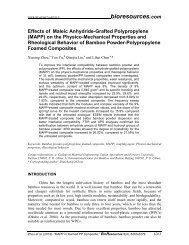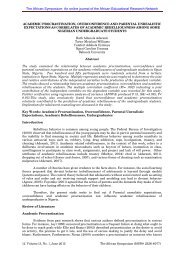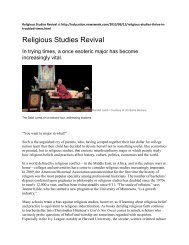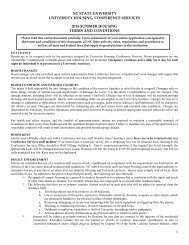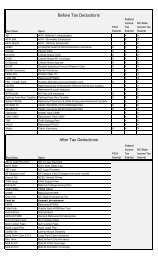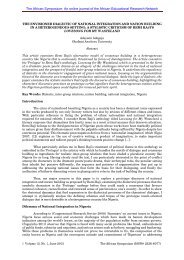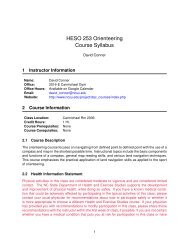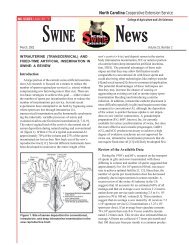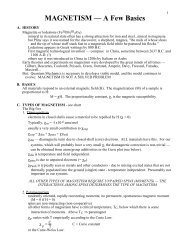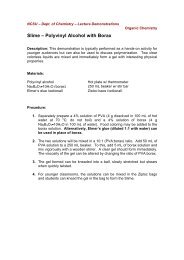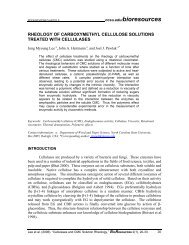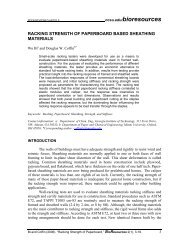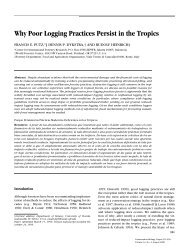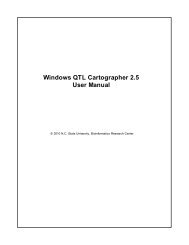Dictators, Songwriters, and the Negotiation of Censorship
Dictators, Songwriters, and the Negotiation of Censorship
Dictators, Songwriters, and the Negotiation of Censorship
You also want an ePaper? Increase the reach of your titles
YUMPU automatically turns print PDFs into web optimized ePapers that Google loves.
Starmakers: <strong>Dictators</strong>, <strong>Songwriters</strong>...<br />
example above, “El Fantasma de Canterville.” Artists were forced to write<br />
<strong>and</strong> rewrite <strong>the</strong>ir own music—<strong>of</strong>ten multiple times. Such a consistent<br />
interaction with <strong>the</strong> censors <strong>of</strong> COMFER would likely lead <strong>the</strong>m to form<br />
expectations <strong>of</strong> what might or might not be allowed under <strong>the</strong> guidelines,<br />
<strong>and</strong> to act accordingly. For example, it was found that <strong>of</strong>ten, meaning was<br />
not policed, just word choice; as long as certain proscribed “hot” words<br />
were avoided, such as “pueblo” or “libertad,” a songwriter could avoid<br />
reformulation (Del Puente 43). In o<strong>the</strong>r words, with sufficient creativity,<br />
writers could express <strong>the</strong>mselves with relative impunity. But as <strong>the</strong><br />
proscribed list grew, musicians found <strong>the</strong>mselves with an ever-decreasing<br />
pool <strong>of</strong> words at <strong>the</strong>ir disposal—as if st<strong>and</strong>ing on an ice floe that was being<br />
chipped away on all sides—<strong>and</strong> <strong>the</strong>y had to become increasingly creative in<br />
<strong>the</strong>ir expression. Lyrics using direct descriptive—rational—language to<br />
comment upon “la realidad argentina” were also more heavily censored<br />
(Del Puente 44). Accordingly, it behooved songwriters to shy away from a<br />
direct denunciation such as Piero’s “[q]ue se vayan ellos / los que<br />
torturaron.”<br />
This evolution can be clearly traced in examples from one<br />
paradigmatic album. A comparison between <strong>the</strong> first version proposed by<br />
writer Charly García <strong>and</strong> <strong>the</strong> heavily modified product that <strong>the</strong> censors<br />
finally allowed to be released brings to light <strong>the</strong> shift from<br />
direct/descriptive rational discourse toward oblique/suggestive poetic<br />
discourse. The album that came to be called Pequeñas anécdotas sobre las<br />
instituciones, did not turn out to be <strong>the</strong> album that <strong>the</strong> singers, Charly<br />
García <strong>and</strong> Nito Mestre had intended, because <strong>the</strong> pressure <strong>of</strong> censorship<br />
necessitated numerous changes. Producer Jorge Alvarez had informed<br />
<strong>the</strong>m that “la mano viene pesada” <strong>and</strong> “hay que reemplazar temas y<br />
cambiar algunas letras” (“Enciclopedia del rock argentino”). The end result<br />
was that many revisons were made in <strong>the</strong> lyrics, with two songs being cut<br />
altoge<strong>the</strong>r, although <strong>the</strong>y had already been recorded <strong>and</strong> mixed. Though<br />
<strong>the</strong> album was finally released at that time with <strong>the</strong> modifications, current<br />
re-releases <strong>of</strong> <strong>the</strong> original vinyl in CD format have re-added <strong>the</strong> cut songs as<br />
59



